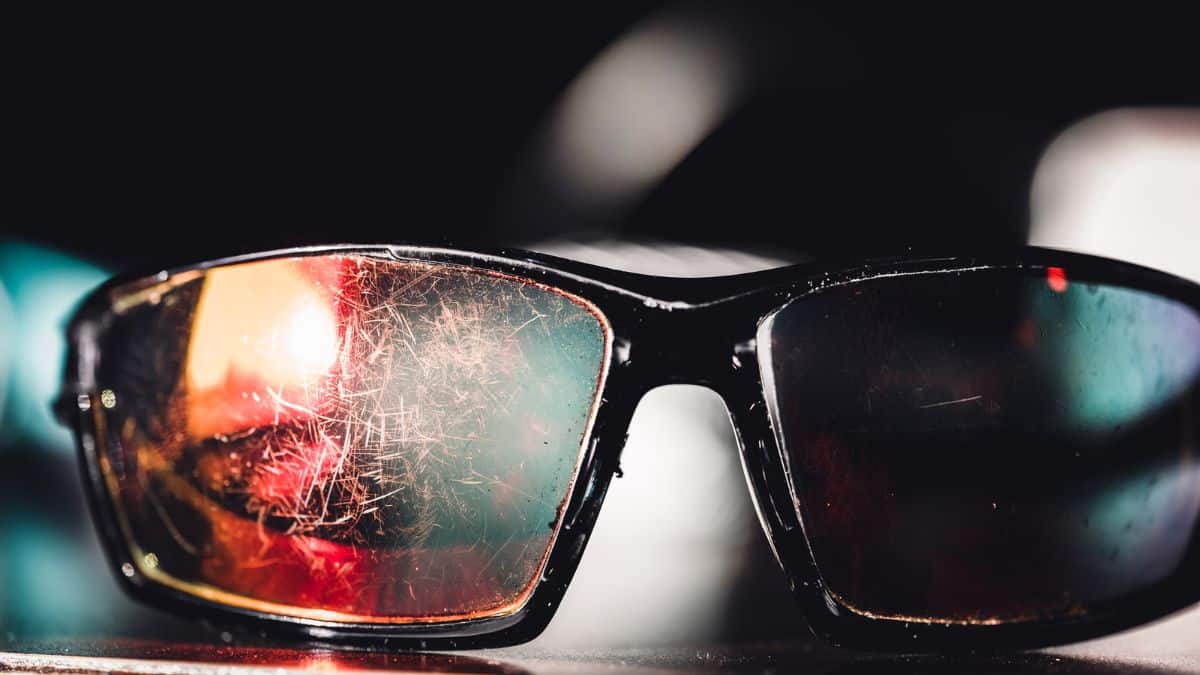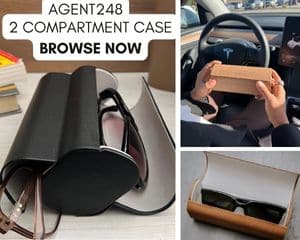Sunglasses aren’t just a fashion statement; they’re a daily necessity that shields our eyes from harsh sunlight. But what happens when those trusty shades get scratched?
It’s a common frustration, like finding a snag in your favorite sweater. You’re faced with a dilemma: to replace or to repair?
Some of the common ways to fix sunglasses scratches include toothpaste, baking soda paste, brass polish, car wax, etc.
These household items are not just for their primary use; they’re little magicians in disguise.
We’ll explore how these simple solutions can transform your scratched lenses, making them look almost as good as new.
Understanding the Impact of Scratches on Sunglasses
Scratches on sunglasses are more than just a cosmetic issue; they can significantly affect your vision and eye comfort, turning a clear view into a constant struggle for clarity.
The Aesthetic and Functional Downside of Scratched Lenses
- Visual Disruption: Scratches on sunglasses are like smudges on a camera lens. They can ruin the clarity of what you see. This is not just about looks; it’s about how well you can see through them.
- Interference with Vision: Consider attempting to view out of a cloudy window. Scratches can make your view hazy, making it hard to see clearly.
- Eye Strain and Discomfort: Scratches can force your eyes to work harder to focus, leading to discomfort. It’s like trying to read a book with small, blurry text. This extra effort can cause headaches and dizziness.
Risks to Vision and Eye Comfort
- Glare and Blurry Vision: Scratches can create glare or reflections, much like trying to see in bright sunlight without sunglasses. This glare can lead to blurry vision.
- Difficulty Focusing: Scratches can scatter light entering your eyes, making it tough to focus on objects. It’s similar to trying to watch a TV with static interference.
- Strained Focus: Constantly adjusting to see past scratches can tire your eyes, like trying to focus on a moving target.
DIY Solutions: Household Items for Scratch Removal of Sunglasses
Tackling scratches on sunglasses doesn’t always require professional help. Sometimes, the solution lies right in your kitchen or bathroom cabinet. From baking soda to baby wash, household items can be surprisingly effective in minimizing those annoying scratches.
1. Baking Soda Paste: A Simple and Effective Remedy
Start by mixing equal parts of baking soda and water to form a paste. Gently apply this paste on scratched surfaces using a soft, lint-free cloth.
Rub in circular motions for about 10 seconds, then carefully wipe off the paste with a microfiber cloth.
Pros
- Baking soda is a mild abrasive, making it suitable for buffing out shallow scratches without causing harm.
Cons
- This method might not be effective for deeper scratches and requires careful application to avoid potential lens damage.
2. Toothpaste: How Mild Abrasives Can Minimize Scratches
Squeeze a little non-abrasive toothpaste onto a cotton ball or soft cloth. For about ten seconds, lightly stroke it in circular motions over the itch. Afterward, remove any toothpaste residue with a clean microfiber cloth.
Pros
- The mild abrasive nature of toothpaste can help in reducing the visibility of minor scratches.
Cons
- It’s less effective on deep scratches and might strip off lens coatings, such as UV protection if used too vigorously.
3. Dishwashing Soap: A Surprising Solution for Light Scratches
Apply a small amount of liquid dish soap directly onto the scratch. Using your fingers, gently work the soap into the lens, adding a bit of lukewarm water to help spread it evenly.
For persistent scratches, use a microfiber cloth with more pressure in circular motions. Let the lens air dry, then clean it with a fresh glass-cleaning cloth.
Pros
- Dish soap is gentle and can effectively reduce the appearance of light scratches.
Cons
- This method may not yield results when applied to deeper scratches and must be applied with a delicate touch to avoid further damage.
4. Vinegar and Water: Natural Cleaning for Clearer Lenses
Create a mixture of equal parts vinegar and water in a spray bottle. Spray this solution onto the lenses and gently wipe them with a microfiber cloth.
Pros
- Vinegar, a natural cleaner, can help in removing dirt and minor imperfections from the lens surface.
Cons
- It may not be effective for actual scratch removal, and the strong vinegar odor can be off-putting for some.
5. Baby Wash: A Safe and Gentle Approach for Delicate Surfaces
Dilute a small quantity of baby wash in water to make a soapy solution. Apply this gently to the lenses and rub softly over them. Rinse the lenses with water and dry them with a clean cloth.
Pros
- Baby wash is mild and safe, making it suitable for delicate lens surfaces without causing harm.
Cons
- Like other gentle methods, it may fail to remove deep scratches and is more suited for surface-level care.
Advanced Home Remedies for Persistent Scratches on Sunglasses
When regular household items don’t do the trick, it’s time to turn to more robust methods. For those stubborn scratches that refuse to disappear, advanced home remedies like brass polish and car wax come into play.
These methods, while more intensive, can offer a solution for deeper scratches that simpler methods can’t handle.
1. Brass Polish: A Method for Tougher Scratches
Begin by applying a small amount of brass polish with a lint-free cloth. Gently rub this over the scratched area of your sunglasses in a circular motion for about 10-12 seconds. Afterward, carefully wipe off any excess polish with a microfiber cloth.
Pros
- Brass polish is known for its effectiveness in filling in and reducing the appearance of tougher scratches.
Cons
- However, it’s not a cure-all for very deep scratches and requires careful application to prevent potential damage to the lenses.
2. Car Wax: Filling in Scratches on Sunglass Lenses
Take a small dab of non-abrasive car wax on a cotton ball or piece of soft fabric. Rub it onto the scratch in circular motions for around 12-15 seconds. Once done, remove any excess wax by wiping it with a microfiber cloth.
Pros
- Car wax is excellent for filling in scratches, making them less noticeable on your sunglasses.
Cons
- It’s crucial to use only non-abrasive wax, as abrasive varieties can cause further damage to the lenses.
3. Specialty Cleaning Sprays: Are They Worth It?
These sprays are specifically formulated for lens care. To use, simply follow the instructions provided on the spray bottle, which usually involves spraying directly onto the lenses and wiping them clean.
Pros
- Specialty cleaning sprays are designed to be safe for lenses and can help maintain their clarity.
Cons
- The downside is their cost; some can be pricey. Additionally, their effectiveness varies depending on the brand and type of spray used.
Professional Solutions: When to Seek Expert Help for Sunglasses Scratch?
Sometimes, the scratches on your sunglasses are too stubborn for home remedies. In such cases, professional help is not just a choice but a necessity.
Understanding when to step up from DIY methods to expert solutions is crucial for maintaining both the functionality and longevity of your sunglasses.
Identifying Scratches That Require Professional Attention
- Severity of Scratches: Minor scratches might be annoying, but they often don’t hinder vision significantly. Scratches that are so deep or numerous that they disrupt your vision are frustrating and confusing.
- Prescription Sunglasses: For those wearing prescription sunglasses, even small scratches can have a big impact. In such cases, consulting an eye care professional is advisable before trying DIY solutions.
The Benefits of Optician Consultation for Sunglass Repair
- Expert Guidance: Opticians can offer advice on repairing or replacing scratched lenses. It’s like getting a mechanic to check your car; they know what’s best.
- Additional Services: Visiting an optician isn’t just about fixing scratches. It’s also an opportunity for a comprehensive eye exam, ensuring your eyes are healthy and your vision is clear.
Deciding Between Lens Replacement and New Sunglasses
- Assessing the Damage: When scratches are deep or cover a large area, replacing the lenses might be more effective than trying to repair them. It’s like replacing a worn-out tire instead of constantly patching it.
- Cost and Quality Consideration: Opticians can help you weigh the cost and benefits of getting new lenses versus buying a new pair of sunglasses. It’s a balance between budget and quality, ensuring you get the best value for your money.
Preventing Future Sunglasses Scratches: Care and Maintenance Tips
Keeping your sunglasses scratch-free is like taking care of a favorite gadget. With the right care and handling, you can maintain their pristine condition for longer. Here are some essential tips for cleaning, storing, and handling your sunglasses to prevent future scratches.
Proper Cleaning Techniques to Avoid Lens Damage
- Always clean your sunglasses with a microfiber cloth and a gentle lens cleaning solution. It’s like using a soft sponge to clean a delicate dish.
- Stay away from paper towels or clothing for cleaning the lenses, as they can be abrasive, similar to using a rough scrub on a non-stick pan.
- Rinse your sunglasses under lukewarm water before wiping them. This step removes debris, akin to rinsing off a plate before wiping it clean.
Storage Solutions to Protect Sunglasses from Harm
- When not in use, store your sunglasses in a hard case. It’s like putting a helmet on your favorite action figure.
- Keep your sunglasses out of direct sunlight and away from hot or humid environments. It’s similar to keeping electronics away from direct heat to prevent damage.
Best Practices for Handling and Wearing Sunglasses
- Never place your sunglasses lens-side down. It’s like laying a smartphone face-down on a rough surface.
- Always return your sunglasses to their case when you’re not wearing them, much like putting away a musical instrument in its case.
- Avoid resting your sunglasses on top of your head. This habit can stretch the frames and scratch the lenses, similar to stretching out a hat by wearing it improperly.
FAQs
Are DIY methods effective for deep scratches on sunglasses?
DIY methods are generally more effective for light scratches. Deep scratches might require professional repair or lens replacement for the best results.
How can I tell if a scratch is too deep to fix at home?
If a scratch is deep enough to feel with your fingernail or if it significantly obstructs your vision, it’s likely too deep for home remedies and may require professional attention.
Is it safe to use toothpaste on all types of sunglasses lenses?
Toothpaste should be used cautiously as it can sometimes be abrasive. It’s recommended to use non-abrasive, gel-based toothpaste and to test it on a small area first.
What should I avoid using when cleaning my sunglasses?
Avoid using rough materials like paper towels, tissues, or clothing for cleaning, as they can scratch the lenses. Stick to microfiber cloths and lens-safe cleaning solutions.
Can applying car wax on sunglasses lenses help remove scratches?
Car wax can help fill in and make shallow scratches less visible, but it’s not a permanent solution and should be used with caution to avoid damaging the lenses.
Is it better to replace scratched lenses or buy new sunglasses?
This depends on the severity of the scratches, the cost of replacement lenses versus a new pair, and the sentimental value of the sunglasses. For high-quality or prescription sunglasses, lens replacement might be more cost-effective.
Conclusion
In summary, fixing scratches on sunglasses involves a range of methods, from home remedies like baking soda and toothpaste to professional lens replacement.
However, the most effective strategy is to prevent scratches through proper care and handling.
Whether you choose a DIY approach or professional repair, the longevity and effectiveness of your sunglasses largely depend on regular maintenance and careful usage.



